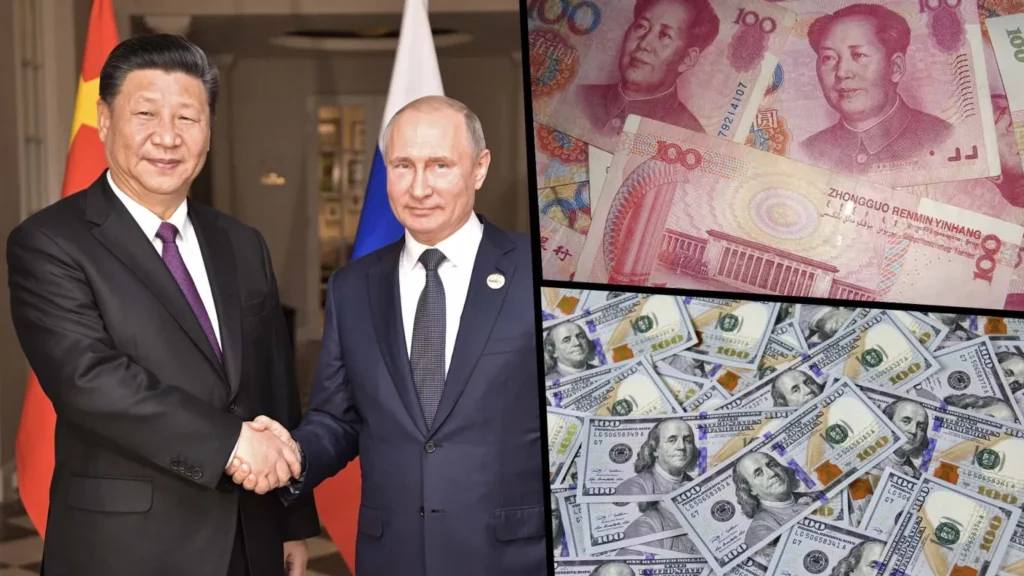Russia Dropping US Dollar for Chinese Yuan – And Fast
ECONOMICS, 2 Jan 2023
Ben Norton | Multipolarista – TRANSCEND Media Service
26 Dec 2022 – In response to Western sanctions, Russia’s central bank is dropping the US dollar and will buy Chinese yuan on the foreign exchange market. The yuan’s share of Moscow’s currency trading increased from 1% to 40-45% in 2022, while dollar trade halved from 80% to 40%.
Russia has spent years trying to decrease its dependency on the US dollar. But especially since the escalation of the proxy war in Ukraine in 2022, Moscow has accelerated its drive toward de-dollarization.
Western sanctions have locked Russia out of the US-dominated international financial architecture. Numerous Russian banks were disconnected from the SWIFT inter-bank messaging system. Washington and Brussels even froze a staggering $300 billion of the Russian central bank’s foreign exchange reserves.
In response, Russia’s central bank has largely abandoned the US dollar and euro, and instead it plans to buy Chinese yuan on the currency market.
httpv://www.youtube.com/watch?v=ffFseEPa62M&t=1s
In the span of less than a year, the yuan has quickly replaced the dollar as the most sought foreign currency in Moscow.
According to the Federal Reserve, the US dollar is involved in around 80% of global trade, and the dollar makes up approximately 60% of globally disclosed official foreign reserves, as of 2021.
But rising geopolitical conflict, fueled by Washington’s new cold war, has pushed Russia, China, Iran, and a growing list of countries to try to de-dollarize, or at least to diversify their foreign reserves.
Reuters reported that daily “yuan-rouble trading volumes on the Moscow Exchange are already exceeding dollar-rouble trades on some days,” and noted that this trend is likely to increase in 2023.
Russia has already made importers of its oil and gas pay in its currency, the ruble, in a challenge to the petrodollar.
An anonymous source in Russia’s banking system told Reuters, “The central bank can currently now buy yuan,” and, “if next year budget revenues from the export of oil and gas exceed 8 trillion roubles, then the central bank will buy yuan.”
Another anonymous source in the Russian government said to Reuters, “We have a lot of friendly currencies. On the exchange, the Chinese yuan is the most traded currency, it is the friendliest currency so far.”
With the conflict in Ukraine and Western sanctions on Moscow shutting Russia's banks and many of its companies out of the dollar and euro payment systems, China’s yuan has swept into the country's markets, presenting an economic counterweight to the dollar https://t.co/3OsuyJqsEt pic.twitter.com/bJvcPUNvYW
— Reuters (@Reuters) November 29, 2022
In a separate report, titled “The yuan’s the new dollar as Russia rides to the redback,” Reuters revealed that the yuan’s share of trading on Russia’s currency market increased from 1% to 40-45% in less than a year.
At the same time, dollar trade halved from 80% to 40% of volumes on the Moscow Exchange.
Russia has quickly become the world’s fourth-biggest offshore trading center for renminbi – a drastic change, considering it was not even in the top 15 at the beginning of the year.
Reuters acknowledged that Moscow’s de-dollarization campaign is not new, but it accelerated in 2022.
“While the yuan, or renminbi, has been making gradual inroads into Russia for years, the crawl has turned into a sprint in the past nine months as the currency has swept into the country’s markets and trade flows,” the media outlet wrote.
It added, “Russia’s financial shift eastwards could boost cross-border commerce, present a growing economic counterweight to the dollar and limit Western efforts to pressure Moscow by economic means.”
In a report in March, the International Monetary Fund (IMF) warned of an “erosion of dollar dominance.”
The US-dominated International Monetary Fund (IMF) has warned of an “erosion of dollar dominance”
Use of Chinese yuan in global central bank reserves is increasing
And Western sanctions on Russia could weaken the dollar, strengthening other currencieshttps://t.co/weF255asil
— Ben Norton (@BenjaminNorton) March 31, 2022
The IMF noted that the use of Chinese yuan in global central bank reserves has increased, while holdings of the US dollar declined from roughly 70% in year 2000 to less than 60% by 2021.
Western sanctions on Russia have also incentivized countries around the world to create new financial systems for regional trade in other currencies – not just adversaries, but also longtime US allies such as India, Egypt, and even Saudi Arabia.
In July, Russia’s President Vladimir Putin visited Iran, where the two countries signed a $40 billion energy cooperation agreement, and pledged to deepen their economic integration.
Both Putin and Iran’s Supreme Leader Ali Khamenei called to challenge the dominance of the US dollar, instead proposing the use of local currencies for trade.
Iran & Russia pledge to cut US dollar from global trade, strengthen China alliance
Video, podcast, and sources here:https://t.co/MzXopEfBpW
— Ben Norton (@BenjaminNorton) July 23, 2022
_____________________________________
 Benjamin Norton is an investigative journalist, analyst, writer and filmmaker. He is the founder and editor of Multipolarista and is based in Latin America. His website: BenNorton.com (Publicaciones en español aquí.)
Benjamin Norton is an investigative journalist, analyst, writer and filmmaker. He is the founder and editor of Multipolarista and is based in Latin America. His website: BenNorton.com (Publicaciones en español aquí.)
Go to Original – multipolarista.com
Tags: Anglo America, Biden, China, Dollar, Economics, Finance, International Trade, Putin, Russia, USA, Xi Jinping, Yuan
DISCLAIMER: The statements, views and opinions expressed in pieces republished here are solely those of the authors and do not necessarily represent those of TMS. In accordance with title 17 U.S.C. section 107, this material is distributed without profit to those who have expressed a prior interest in receiving the included information for research and educational purposes. TMS has no affiliation whatsoever with the originator of this article nor is TMS endorsed or sponsored by the originator. “GO TO ORIGINAL” links are provided as a convenience to our readers and allow for verification of authenticity. However, as originating pages are often updated by their originating host sites, the versions posted may not match the versions our readers view when clicking the “GO TO ORIGINAL” links. This site contains copyrighted material the use of which has not always been specifically authorized by the copyright owner. We are making such material available in our efforts to advance understanding of environmental, political, human rights, economic, democracy, scientific, and social justice issues, etc. We believe this constitutes a ‘fair use’ of any such copyrighted material as provided for in section 107 of the US Copyright Law. In accordance with Title 17 U.S.C. Section 107, the material on this site is distributed without profit to those who have expressed a prior interest in receiving the included information for research and educational purposes. For more information go to: http://www.law.cornell.edu/uscode/17/107.shtml. If you wish to use copyrighted material from this site for purposes of your own that go beyond ‘fair use’, you must obtain permission from the copyright owner.
